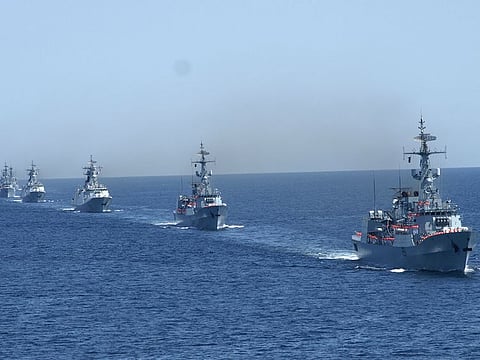45 international navies coming to Pakistan for ‘Aman 21’
Pakistan Navy to host largest international maritime exercise

Islamabad: The Pakistan Navy is all set to host the largest multinational maritime exercise ‘Aman 21’ in the North Arabian Sea in February 2021 with a mission to attain regional peace and counter maritime challenges.
More than 45 countries including the world’s top navies will take part in the 7th exercise of the series held every two years since 2007. What makes this year’s exercise more significant is that it brings the three largest navies, US, China and Russia, under one platform for collaborative maritime security. This will be the first time in a decade that Russia will participate in a joint military exercise with NATO members.
Together for peace
Pakistan Navy’s Aman (Peace) exercise under the motto ‘Together for Peace’ aims to strengthen and develop naval cooperation among the world navies to promote regional stability and counter maritime threats.
It offers the participating counties a chance to “work together keeping differences aside to defeat common adversaries” and hybrid warfare such as terrorism, piracy, terrorism, drugs and arms trafficking, human smuggling, climate change, Pakistan Navy Chief Admiral Amjad Khan Niazi said.
“Aman Exercise is about bridging gaps and making it possible to operate together in pursuance of shared objectives”, the admiral said.
Aman Exercise objectives:
· Contribute to regional peace and stability.
· United resolve against terrorism, crimes and other threats in the maritime domain.
· Bridge the gap and enhance interoperability between regional and extra-regional navies with Pakistan Navy acting as a bridge in the region.
Aims and achievements – from 2007 to 2021
Pakistan Navy initiated the exercise in 2007 with only three participants but the message of collaborative maritime security was widely accepted and the participation greatly expanded.
As many as 46 countries and 115 observers participated in Aman-19 naval exercises and around 11 navies, including those of China, US, UK, Australia, Turkey, Italy, Malaysia, Oman, Sri Lanka participated with their warships.
“It is a huge achievement for Pakistan Navy that the number of participating countries grew immensely in a few years as the message of peace and collaboration appealed to both eastern and western navies, NATO and non-NATO members” said Commodore (R) Syed Mohammed Obaidullah while talking to Gulf News. In comparison to India’s Malabar Exercise, which started in 1992 and attracted only three navies, “Pakistan’s Aman Exercise garnered global recognition as it is not against any country and benefits all states,” he added.
The exercise should “not be seen as war games but drills against non-traditional security threats as the primary goal of Aman exercise is to uphold peace and stability in the region”, Obaidullah stressed.
Aman – Platform for Navies in pursuit of peace
Aman exercises are the embodiment of the country’s commitment to peace and stability in the Indian Ocean Region (IOR) through cooperation between the navies of East and West that share the common goal of peace.
With the growing competition between China and United States in the region, “Pakistan has chosen to act as a bridge in the region due to its traditional role as a peacemaker in maritime domain” says Dr Khurram Iqbal, head of International Relations department at National Defence University (NDU), Islamabad.
Through the Aman exercise, Pakistan “will once again play the role of a peacemaker and provide a platform for China and Russia on one side and US and allies on the other side to come together.”
Aman exercise and the IOR
The exercise is also an enabler of Pakistan Navy’s ambitions of transforming into a blue water force as it is in the process of equipping itself with the modern surface, airborne, submerged and unmanned systems to develop capabilities to play a greater role in the Indian Ocean Region.
Pakistan’s unique geostrategic importance has further elevated with the development of the new Gwadar Port under the multi-billion dollar China Pakistan Economic Corridor (CPEC), which calls for enhanced maritime security.
Gwadar port is located close to the Strait of Hormuz, the world’s most important oil transit chokepoint, and connects three regions South Asia, Middle East and Central Asia. Pakistan Navy’s initiatives such as Aman exercise are also vital to secure the national and global sea routes in the IOR, country’s maritime security, and overall national security, experts say.
· Indian Ocean is one of the vital global trade arteries.
· More than 80% of the world’s oil shipment passes through the region.
· Region is home to 2.7 billion people and world’s fastest growing economies.
· IOR is rich in natural resources.
· One of the world’s most significant regions due to its geological, political, economic, and strategic features.
Sign up for the Daily Briefing
Get the latest news and updates straight to your inbox






